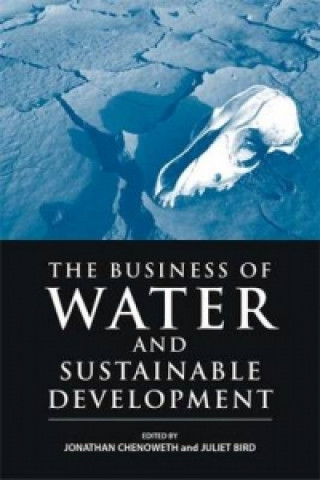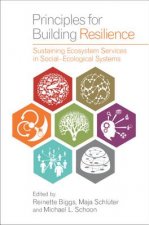
Kód: 05017759
Business of Water and Sustainable Development
Autor Jonathan Chenoweth, Juliet Bird
A renewed commitment to improved provision of water and sanitation emerged in the 2002 Johannesburg Declaration on Sustainable Development. Although many of the statements in the Declaration were vaguely worded, making it hard to ... celý popis
- Jazyk:
 Angličtina
Angličtina - Väzba: Pevná
- Počet strán: 277
Nakladateľ: Taylor & Francis Ltd, 2005
- Viac informácií o knihe

87.83 €
Dostupnosť:
50 % šanca Máme informáciu, že by titul mohol byť dostupný. Na základe vašej objednávky sa ho pokúsime do 6 týždňov zabezpečiť.
Máme informáciu, že by titul mohol byť dostupný. Na základe vašej objednávky sa ho pokúsime do 6 týždňov zabezpečiť.Prehľadáme celý svet
Mohlo by sa vám tiež páčiť
-

Guitar Cultures
60.71 € -

Cambridge Edition of the Works of F. Scott Fitzgerald
128.01 € -

Lulu's Clothes
10.11 € -13 % -

Community and Conflict
70.02 € -

Hypothesis A / Hypothesis B
14.66 € -

Passions
89.96 € -

Print Culture, Crime and Justice in 18th-Century London
204.92 € -

All by Myself!
7.48 € -19 % -

Identification of Time-Varying Processes
314.11 € -

Progressive Politics in the Global Age
28.83 € -

At what cost?
52.31 € -

Barefoot Waltz (yaoi)
16.08 € -

hermetische Bund teilt mit
21.44 € -

Die Prufung nichtmetallischer Baustoffe
63.85 €
Darujte túto knihu ešte dnes
- Objednajte knihu a vyberte Zaslať ako darček.
- Obratom obdržíte darovací poukaz na knihu, ktorý môžete ihneď odovzdať obdarovanému.
- Knihu zašleme na adresu obdarovaného, o nič sa nestaráte.
Informovať o naskladnení knihy
Zadajte do formulára e-mailovú adresu a akonáhle knihu naskladníme, zašleme vám o tom správu. Postrážime všetko za vás.
Viac informácií o knihe Business of Water and Sustainable Development
Nákupom získate 220 bodov
 Anotácia knihy
Anotácia knihy
A renewed commitment to improved provision of water and sanitation emerged in the 2002 Johannesburg Declaration on Sustainable Development. Although many of the statements in the Declaration were vaguely worded, making it hard to measure progress or success, the Plan of Implementation of the Summit, agreed by the delegates to the conference, clearly stated that: "we agree to halve, by the year 2015, the proportion of people who are unable to reach or to afford safe drinking water and the proportion of people who do not have access to basic sanitation". Given the United Nations' predicted growth in global population from 6.1 billion in 2000 to 7.2 billion by 2015, this commitment will pose formidable challenges. To meet it, by the end of just a decade and half, approximately 6.6 billion people will need to have access to safe drinking water supplies. This is more than the current population of the world, and involves not only maintaining existing levels of supply but also providing new or upgraded services to 1.7 billion people. The challenge for sanitation is equally daunting: 5.8 billion people will need to be serviced, including new access provision for 2.1 billion. Even if these ambitious targets are met, representing a major achievement for the global community, there will still be approximately 650 million people in the world without access to safe drinking water and 1.4 billion without sanitation. What is clear is the magnitude of the problem facing the international community in terms of water supply and sanitation. Continuation of the status quo and the type of progress made during the 1990s will not permit the Johannesburg targets to be met. Instead it will be necessary to promote a combination of many different, new and innovative approaches, each of which will contribute towards the overall targets. These approaches must include technological advances that identify new sources and improve the quality of those already in use; managerial techniques that increase the efficiency and effectiveness of service delivery at both micro and macro scale; and fiscal approaches that tap into additional financial resources to make improvements affordable. In the past each of these aspects was seen as primarily the responsibility of government, which supported research into technology, managed supply and disposal systems and provided the funds to pay for them. This view has changed - beginning in the 1980s and increasing in the 1990s with growing moves towards privatisation of many aspects of the water sector. Underpinning this has been a shift away from seeing water as a public good that is essential for life, with subsidised supply provided as part of an overall welfare system, to a more market-oriented approach where the state, although still responsible for maintaining universal access to water services, uses market forces to meet this aim. The Business of Water and Sustainable Development aims to illustrate the range of approaches that will be necessary if the percentage of the global population having access to adequate and safe water and sanitation is to be increased in line with the brave assertions from Johannesburg World Summit on Sustainable Development. Some of approaches will be large-scale "Western-style" improvements involving the creation of new business models, their effectiveness assessed by traditional approaches of fiscal and social analysis. Such schemes may be instigated and partly funded by governments, but are increasingly turning to the private sector for money and expertise. In contrast, many smaller communities would be better served by following another path to improved water supply and sanitation. Because of their size, location or traditions they may achieve better results through the adoption of local small-scale solutions. Non-governmental organisations have been very active in this area, but to extend their operations many are seeking to adopt a more business-like model. All water supply and waste disposal agencies, large or small, need to support and encourage continued research into technological solutions that seek out better, more sustainable ways to use our increasingly scarce supplies of good-quality fresh water.
 Parametre knihy
Parametre knihy
Zaradenie knihy Knihy po anglicky Economics, finance, business & management Economics Environmental economics
87.83 €
- Celý názov: Business of Water and Sustainable Development
- Autor: Jonathan Chenoweth, Juliet Bird
- Jazyk:
 Angličtina
Angličtina - Väzba: Pevná
- Počet strán: 277
- EAN: 9781874719304
- ISBN: 1874719306
- ID: 05017759
- Nakladateľ: Taylor & Francis Ltd
- Hmotnosť: 600 g
- Rozmery: 240 × 155 × 23 mm
- Dátum vydania: 01. September 2005
Obľúbené z iného súdka
-

Environmental Economics: A Very Short Introduction
10.01 € -22 % -

Beyond Economics and Ecology
15.37 € -19 % -

Harvesting the Biosphere
31.36 € -

2052
21.75 € -23 % -

Smart Solutions to Climate Change
46.04 € -

Handbook of Environmental and Sustainable Finance
72.55 € -24 % -

Climate Shock
39.15 € -

Harvesting the Biosphere
34.70 € -12 % -

Solar Driven Green Hydrogen Generation and Storage
217.87 € -

Green New Deal
30.25 € -23 % -

Economics of Natural Resources and the Environment
47.55 € -

Natural Capital
18.61 € -

Plundered Planet
12.13 € -23 % -

Principles of Sequence Stratigraphy
106.15 € -

Bet
24.58 € -

Introduction to Environmental Economics
77.61 € -

Indra's Net and the Midas Touch
10.21 € -12 % -

Spirituality and Sustainability
137.93 € -

Environmentalism of the Poor
47.86 € -27 % -

Infrastructure Finance in Europe
236.70 € -

Comprehensive Evaluation of Environmental Management Policies and Technologies
112.63 € -

Circular Economy and Sustainability
238.82 € -

Capitalism in the Web of Life
107.67 € -

Environmental Economics and Natural Resource Management
95.42 € -

Intermediate Environmental Economics
220.91 € -

Industrial Pollution Prevention
212.10 € -

Renewable Energy and Energy Efficiency
67.49 € -

Economics and Environment
50.89 € -

Handbook of Thermal Management Systems
236.90 € -

Waste to Wealth
273.94 € -

Principles for Building Resilience
83.78 € -

Understanding Risks and Uncertainties in Energy and Climate Policy
56.05 € -

Sustainability
142.58 € -4 % -

Resilient and Sustainable Farming Systems in Europe
122.34 € -

Environmental Economics
227.79 € -

Capitalism in the Web of Life
31.16 € -

Biofuel Cells
216.15 € -

Prosper!
25.39 € -13 % -

Cities in the Pacific Rim
277.99 € -

Durable Use of Consumer Products
120.22 € -

Advances in Natural Gas: Formation, Processing and Applications. Volume 1: Natural Gas Formation and Extraction
257.95 € -

Economic Incentives and Environmental Policies
70.02 € -

Global Challenges
152.50 € -

Korea
144.10 € -

Economics
12.44 € -13 % -

Handbook of Bioenergy
137.93 € -

Sustainable Development: Concepts, Rationalities and Strategies
212.10 € -

Pesticides in a Changing Environment
218.58 € -

Environmental Economics and Sustainability
43.61 €
Osobný odber Bratislava a 2642 dalších
Copyright ©2008-24 najlacnejsie-knihy.sk Všetky práva vyhradenéSúkromieCookies


 21 miliónov titulov
21 miliónov titulov Vrátenie do mesiaca
Vrátenie do mesiaca 02/210 210 99 (8-15.30h)
02/210 210 99 (8-15.30h)